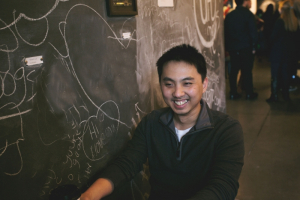Last year, a professor and student in the Cullen College’s chemical engineering department published an article in the journal Science that revealed the secrets behind gold’s unexpected oxidation activity.
Hieu Doan, the chemical engineering Ph.D. student who was a co-author on the Science paper, recently gave an oral presentation about this research at the prestigious Gordon Research Conference (GRC). Out of the over 100 research posters accepted into the conference, Doan’s poster was one of only five that were selected by the GRC organizers to be presented to the conference attendees.
“I felt very honored that my poster was chosen and I was able to present our research at the conference,” said Doan.
The Gordon Research Conferences take place every two years, bringing together scientists from around the world to exchange ideas and present research on the biological, chemical and physical sciences. This year’s conference on the topic of “Chemical Reactions at Surfaces” was held in Ventura, California.
“The Gordon Research Conference is a bit more selective than many other research conferences, in that you must submit your research and an application to be considered to attend the conference,” said Lars Grabow, assistant professor of chemical engineering at the Cullen College. Grabow is Doan’s faculty advisor and was a co-author on the Science article on which Doan’s award-winning GRC poster was based.
“I was so proud to see his poster get chosen for this honor and to witness Hieu do such an excellent job at explaining the research to an expert audience,” Grabow added. “Hieu’s poster even beat the one that I entered into the conference!”
Doan’s poster outlined research he conducted alongside Grabow, which was focused on determining why gold, one of the least reactive of all metals, performs so well as a catalyst when oxidizing carbon monoxide (CO) into carbon dioxide (CO2). The collaborators on this project were Bert Chandler, Johnny Saavedra, and Christopher Pursell at Trinity University in San Antonio.
Together, the team discovered that the reason for gold’s unexpected oxidation is water.
Although people have been experimenting with CO oxidation using gold catalysts for nearly 30 years and many researchers have reported that water can change the reaction kinetics quite drastically, Grabow noted that until now no research has ever reported the exact mechanism that his group identified in their Science article.
“I did notice that several other researchers at the GRC were presenting work on the role of water in other chemical reactions, so it seems that our research has laid out the groundwork for other groups to build upon,” Grabow said.
Doan is currently in his final year as a chemical engineering doctoral student at the University of Houston. After graduation, Doan plans on pursuing a career in the oil and gas industry. “I think I will miss doing research with Dr. Grabow,” Doan said. “But I am looking forward to my future experience in the industry.”
